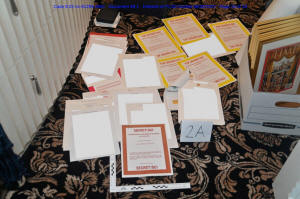U.S. appeals court rules against Trump in documents fight, ends arbiter
 Send a link to a friend
Send a link to a friend
 [December 02, 2022]
By Jacqueline Thomsen [December 02, 2022]
By Jacqueline Thomsen
WASHINGTON (Reuters) -A U.S. appeals court on Thursday dealt a blow to
Donald Trump, reversing a judge's appointment of an independent arbiter
to vet documents seized by the FBI from his Florida home and allowing
all of the records to be used in a criminal investigation of the former
president.
The Atlanta-based 11th Circuit U.S. Court of Appeals ruled in favor of
the Justice Department in its challenge to Florida-based U.S. District
Judge Aileen Cannon's September decision to name a "special master" to
review the records to decide if some should be kept from investigators.
The three-judge 11th Circuit panel said Cannon lacked the authority to
grant Trump's request for a special master made in a lawsuit he filed
two weeks after FBI agents carried out a court-approved Aug. 8 search at
his Mar-a-Lago estate in Palm Beach. It also overturned Cannon's
decision to bar investigators from accessing most of the records pending
the review and threw out Trump's suit.
Trump faces a federal criminal investigation into his retention of
sensitive government records after leaving office in January 2021,
including whether he violated a 1917 law called the Espionage Act that
makes it a crime to release information harmful to national security.
Investigators also are looking into potential unlawful obstruction of
the probe.

FBI agents seized about 11,000 records, including about 100 marked as
classified, during the search.
The 11th Circuit said that while a search warrant for a former
president's property is "extraordinary," it did not give "the judiciary
license to interfere in an ongoing investigation." The court also said
Trump did not prove there was a "callous disregard" for his
constitutional rights in the search of his property, one of the few
reasons a court can intervene in an ongoing investigation.
"The law is clear. We cannot write a rule that allows any subject of a
search warrant to block government investigations after the execution of
the warrant," the panel wrote. "Nor can we write a rule that allows only
former presidents to do so."
The 11th Circuit panel consisted of Judge William Pryor, appointed by
Republican former President George W. Bush, as well as two of Trump's
own appointees, Judges Andrew Brasher and Britt Grant.
Trump is likely to appeal the 11th Circuit's action to the
conservative-majority U.S. Supreme Court. The 11th Circuit said its
order will not take effect for seven days, during which Trump could seek
to challenge it.
[to top of second column]
|

A redacted FBI photograph of documents
and classified cover sheets recovered from a container stored in
former U.S. president Donald Trump's Florida estate, and which was
included in a U.S. Department of Justice filing and released August
30, 2022. U.S. Department of Justice/Handout via REUTERS

A Trump spokesperson called the decision "purely procedural and
based only on jurisdiction," and said it did not address the merits
of the case.
"President Donald J. Trump will continue to fight against the
weaponized Department of 'Justice,' while standing for America and
Americans," the spokesperson added.
The news came as top Justice Department officials were gathered for
an annual holiday party in Washington. They learned they had won the
case from reporters who were also in attendance.
A Justice Department spokesperson declined to comment.
Three days after Trump announced a run for the 2024 Republican
presidential nomination, U.S. Attorney General Merrick Garland on
Nov. 18 appointed a special counsel, Jack Smith, to oversee the
documents criminal investigation and another one also relating to
Trump.
Cannon, who was appointed to her judgeship by Trump, named Raymond
Dearie, another federal judge, to review the records to consider
whether any should be walled off from the criminal investigation.
Cannon also halted prosecutors from using the documents taken in the
search as part of their criminal investigation until the conclusion
of Dearie's review, although a separate 11th Circuit panel later
gave the government access to the materials marked as classified.
Trump's lawyers had asked Dearie to find that some documents are
protected by executive privilege, a legal doctrine that permits
presidents to keep certain communications secret, or meet the
definition of "personal" papers that should be kept private. Trump's
lawyers argued that he designated certain records as his personal
papers, a claim that the Justice Department disputes.
(Reporting by Jacqueline Thomsen in Washington; Additional reporting
by Sarah N. Lynch and Kanishka Singh; Editing by Will Dunham and
Noeleen Walder)
[© 2022 Thomson Reuters. All rights
reserved.]
This material may not be published,
broadcast, rewritten or redistributed.
Thompson Reuters is solely responsible for this content.
 |